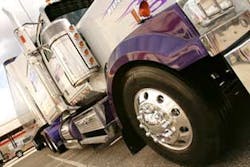Trucking association blasts cap-and-trade plan
Cap-and-trade legislation will impose significant costs on both the trucking industry and consumers, according to the American Trucking Associations (ATA).
What's more, says the group, proposed legislation will fail to reduce trucking industry greenhouse emissions.
During a Washington D.C. press conference held on Oct. 21, Barbara Windsor, the ATA's first vice chairman and president of Hahn Transportation in New Market, Md., explained that cap-and-trade legislation cannot reduce carbon emissions from trucks "because the trucking industry is not a discretionary user of fuel.
"Proponents of cap-and-trade believe that increasing the price of fuel will encourage the use of more fuel-efficient vehicles or alternative-fueled vehicles, but the trucking industry has no such options."
Windsor's remarks followed the release of a report by U.S. Sens. Kay Bailey Hutchison (R-Texas) and Kit Bond (R-Mo.) that said cap-and-trade legislation would assess $3.6 trillion in "gas taxes" on American families and businesses. "This includes $1.3 trillion in diesel fuel taxes," says the ATA.
"Trucks depend on diesel fuel to deliver nearly 70% of U.S. freight and virtually every consumer good -- food, clothing, medicine, appliaces -- at some point in the supply chain. Any substantial fuel cost increase imposed directly or indirectly on the trucking industry will cause the cost of all these essential products to rise."
